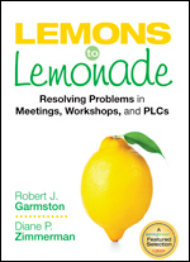Lemons to Lemonade: Resolving Problems in Meetings & More
Lemons to Lemonade: Resolving Problems in Meetings, Workshops, and PLCs
By Robert J. Garmston and Diane P. Zimmerman
(Corwin/Sage, 2013 – Learn more)
We know as educators that time spent collaborating with colleagues can be incredibly powerful. We also know that team meetings can be stressful. When a group of people with unique experiences, personalities, opinions and values come together to problem-solve and plan, fireworks often erupt.
So many educators (and administrators in particular) are subjected to hours spent in one meeting after another, yet often leave the meeting thinking their time was wasted. Some may feel that real issues are not discussed because certain participants dominate the conversations while others remain unwilling to contribute. Participants may also complain that disagreements and conflicts are not dealt with promptly or effectively.

Despite our best intentions, and due to a variety of factors, team meetings often become unproductive. As an elementary school principal, I found managing and facilitating PLCs and other team meetings an exhilarating but often mind-boggling experience.
The strategies shared in Lemons to Lemonade help facilitators understand the needs of particular groups and address specific group dynamics in order to ensure collaborative efforts are fruitful and enjoyable for participants.
What you’ll find in Lemons to Lemonade
The introductory chapters set the stage for the difficult work of facilitating a meeting or workshop. Chapter One opens “with an example that demonstrates the work of an expert facilitator—knowing just how and when to intervene to keep both individuals and group members working toward productive ends.” Garmston and Zimmerman go on to discuss the skill sets of the novice vs. the expert facilitator and help readers build personal confidence that masterful facilitation is within their reach.
The book is then organized to provide meeting facilitators with a repertoire of interventions to assist in addressing common conflicts and problems that arise and thwart collaboration. A “Problem Locator” graphic is included to help readers pinpoint specific chapters to find interventions that will be most useful for their conflicts, including insufficient confidence, deciding when and how to intervene, overcoming judgmental responses, group conflict, personal attacks, and managing disruptive participants.
The authors also share helpful intervention principles such as compassion, precise language, and congruence, which help ensure participants feel safe and keep the group focused, even when disruptive events occur. Learning when to intervene is just as important as knowing how to intervene, and the authors share step-by-step strategies to help facilitators intervene effectively and in a timely manner.
Lemons to Lemonade offers a number of resources to help facilitators skillfully manage teams in order to enhance productivity and ensure positive outcomes. At the heart of the strategies and messages shared in this book lies a willingness to serve the group. As educational meeting facilitators, we need to embrace the positive qualities of each and every team member, and nurture and support the group in order to best serve the organization and our students and families.
Lyn Hilt is a district-level elementary instructional technology integrator/coach who believes all students deserve learner-centered, passion-driven educational experiences. Prior to this role, she served as principal of a K-6 elementary school for five years and taught both primary and intermediate grades. She blogs about teaching, learning and leadership at Learning in Technicolor. Follow her on Twitter @lynhilt. Lyn and her husband live in Pennsylvania with their delightful infant son and two sweet, rescued greyhounds.


































